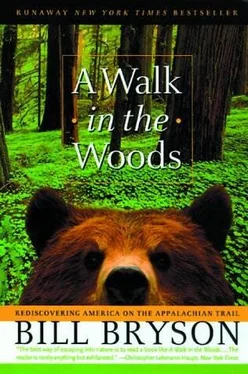Bill Bryson - A Walk In The Woods
Здесь есть возможность читать онлайн «Bill Bryson - A Walk In The Woods» весь текст электронной книги совершенно бесплатно (целиком полную версию без сокращений). В некоторых случаях можно слушать аудио, скачать через торрент в формате fb2 и присутствует краткое содержание. Жанр: Современная проза, на английском языке. Описание произведения, (предисловие) а так же отзывы посетителей доступны на портале библиотеки ЛибКат.
- Название:A Walk In The Woods
- Автор:
- Жанр:
- Год:неизвестен
- ISBN:нет данных
- Рейтинг книги:4 / 5. Голосов: 1
-
Избранное:Добавить в избранное
- Отзывы:
-
Ваша оценка:
- 80
- 1
- 2
- 3
- 4
- 5
A Walk In The Woods: краткое содержание, описание и аннотация
Предлагаем к чтению аннотацию, описание, краткое содержание или предисловие (зависит от того, что написал сам автор книги «A Walk In The Woods»). Если вы не нашли необходимую информацию о книге — напишите в комментариях, мы постараемся отыскать её.
A Walk In The Woods — читать онлайн бесплатно полную книгу (весь текст) целиком
Ниже представлен текст книги, разбитый по страницам. Система сохранения места последней прочитанной страницы, позволяет с удобством читать онлайн бесплатно книгу «A Walk In The Woods», без необходимости каждый раз заново искать на чём Вы остановились. Поставьте закладку, и сможете в любой момент перейти на страницу, на которой закончили чтение.
Интервал:
Закладка:
“You know, I don’t honestly know,” he said as if he had been wondering that himself for some time.
“When did you start your hike?”
“January 27th.”
“January 27th?” I said in small astonishment and did a quick private calculation on my fingers. “That’s almost five months.”
“Don’t I know it,” he said with a kind of happy ruefulness.
He had been walking for the better part of half a year, and he was still only three-quarters of the way to Katahdin.
“What kind of”-I didn’t know quite how to put this-“what kind of miles are you doing, John?”
“Oh, ‘bout fourteen or fifteen if all goes well. Trouble is”-he slid me a sheepish look-“I get lost a lot.”
That was it. chicken John was forever losing the trail and ending up in the most improbable places. Goodness knows how anyone could manage to lose the Appalachian Trail. It is the most clearly defined, well-blazed footpath imaginable. Usually it is the only thing in the woods that isn’t woods. If you can distinguish between trees and a long open corridor through the trees you will have no trouble finding your way along the AT. Where there might be any doubt at all-where a side trail enters or where the AT crosses a road-there are always blazes. Yet people do get lost. The famous Grandma Gatewood, for instance, was forever knocking on doors and asking where the heck she was.
I asked him what was the most lost he had ever been.
“Thirty-seven miles,” he said almost proudly. “I got off the trail on Blood Mountain in Georgia-still don’t know how exactly-and spent three days in the woods before I came to a highway. I thought I was a goner that time. I ended up in Tallulah Falls-even got my picture in the paper. The police gave me a ride back to the trail the next day, and pointed me the right way. They were real nice.”
“Is it true you once walked three days in the wrong direction?”
He nodded happily. “Two and a half days to be precise. Luckily, I came to a town on the third day, and I said to a feller, ‘Excuse me, young feller, where is this?’ and he said, ‘Why, it’s Damascus, Virginia, sir,’ and I thought, well, that’s mighty strange because I was in a place with the very same name just three days ago. And then I recognized the fire station.”
“How on earth do you-” I decided to rephrase the question. “How does it happen, John, exactly?”
“Well, if I knew that, I wouldn’t do it, I suppose,” he said with a kind of chuckle. “All I know is that from time to time I end up a long way from where I want to be. But it makes life interesting, you know. I’ve met a lot of nice people, had a lot of free meals. Excuse me,” he said abruptly, “you sure we’re going the right way?”
“Positive.”
He nodded. “I’d hate to get lost today. There’s a restaurant in Dalton.” I understood this perfectly. If you’re going to get lost, you don’t want to do it on a restaurant day.
We walked the last six miles together, but we didn’t talk much after that. I was doing a nineteen-mile day, the longest I would do anywhere on the trail, and even though the grade was generally easy and I was carrying a light pack, I was real tired by late afternoon. John seemed content to have someone to follow, and in any case he had his hands full scrutinizing the trees.
It was after six when we reached Dalton. John had the name of man on Depot Street who let hikers camp in his backyard and use his shower, so I went with him to a gas station while he asked directions. When we emerged, he started off in precisely the wrong direction.
“It’s that way, John,” I said.
“Of course it is,” he agreed. “And the name’s Bernard, by the way. I don’t know where they got that chicken John from.”
I nodded and told him I would look for him the next day, but I never did see him again.
I spent the night in a motel and the next day hiked on to cheshire. It was only nine miles over easy terrain, but the blackfly made it a torment. I have never seen a scientific name for these tiny, vile, winged specks, so I don’t know what they are other than a hovering mass that goes with you wherever you go and are forever in your ears and mouth and nostrils. Human sweat transports them to a realm of orgasmic ecstasy, and insect repellent only seems to excite them further. They are particularly relentless when you stop to rest or take a drink-so relentless that eventually you don’t stop to rest and you drink while moving, and then spit out a tongueful of them. It’s a kind of living hell. So it was with some relief that I stepped from their woodland realm in early afternoon and strolled into the sunny, dozing straggle that was the little community of cheshire.
cheshire had a free hostel for hikers in a church on the main street (Massachusetts people do a lot for hikers, it seems; elsewhere I had seen houses with signs inviting people to help themselves to water or pick apples from trees), but I didn’t feel like a night in a bunkhouse, still less a long afternoon sitting around with nothing to do, so I pushed on to Adams, four miles away up a baking highway, but with at least the prospect of a night in a motel and a choice of restaurants.
Adams had just one motel, a dumpy place on the edge of town. I took a room and passed the rest of the afternoon strolling around, idly looking in store windows and browsing through boxes or books in a thrift shop (though of course there was nothing but Reader’s Digest volumes and those strange books you see only in thrift shops, with titles like Home Drainage Encyclopedia: Volume One and Nod If You Can Hear Me: Living with a Human Vegetable) and afterwards wandered out into the country to look at Mount Greylock, my destination for the next day. Greylock is the highest eminence in Massachusetts and the first hill over 3,000 feet since Virginia for northbound hikers. It’s just 3,491 feet to the top, but, surrounded as it is by much smaller hills, it looks considerably bigger. It has in any case a certain imposing majesty that beckons. I was looking forward to it.
And so, early the next morning, before the day’s heat had a chance to get properly under way (a scorcher was forecast), I stopped in town for a can of pop and a sandwich for my lunch, and then set off on a wandering dirt road towards the Gould Trail, a side trail leading steeply up to the AT and on to Greylock.
Greylock is certainly the most literary of Appalachian mountains. Herman Melville, living on a farm called Arrowhead on its western side, stared at it from his study window while he wrote Moby-Dick, and, according to Maggie Stier and Ron McAdow in their excellent Into the Mountains, a history of New England’s peaks, claimed that its profile reminded him of a whale. When the book was finished, he and a group of friends hiked to the top and partied there till dawn. Nathaniel Hawthorne and Edith Wharton also lived nearby and set works there, and there was scarcely a literary figure associated with New England from the 1850s to 1920s who didn’t at some time hike or ride up to admire the view.
Ironically, at the height of its fame, Greylock lacked much of the green-cloaked majesty it enjoys today. Its sides were mangy with the scars of logging, and the lower slopes were pitted with slate and marble quarries. Big, ramshackle sheds and sawhouses poked into every view. All that healed and grew over, but then in the 1960s, with the enthusiastic support of state officials in Boston, plans were drawn up to turn Greylock into a ski resort, with an aerial tram, a network of chairlifts, and a summit complex consisting of a hotel, shops, and restaurants (all in soaring 1960s Jetsons-style architecture) but luckily nothing ever came of it. Today Greylock sits on 11,600 acres of preserved land. It’s a beauty.
Читать дальшеИнтервал:
Закладка:
Похожие книги на «A Walk In The Woods»
Представляем Вашему вниманию похожие книги на «A Walk In The Woods» списком для выбора. Мы отобрали схожую по названию и смыслу литературу в надежде предоставить читателям больше вариантов отыскать новые, интересные, ещё непрочитанные произведения.
Обсуждение, отзывы о книге «A Walk In The Woods» и просто собственные мнения читателей. Оставьте ваши комментарии, напишите, что Вы думаете о произведении, его смысле или главных героях. Укажите что конкретно понравилось, а что нет, и почему Вы так считаете.












